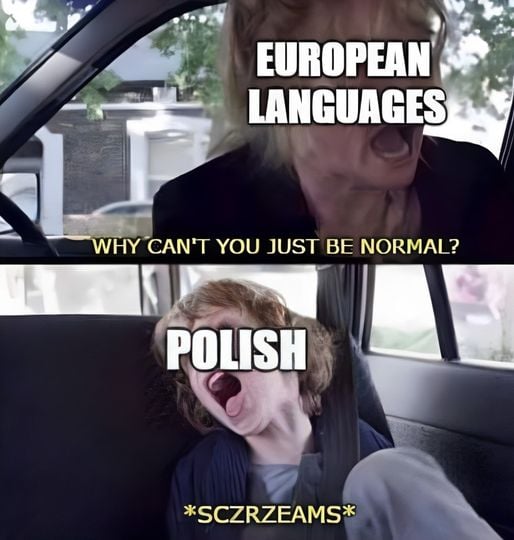Ä, ö, ü, am i a joke to you?
memes
Community rules
1. Be civil
No trolling, bigotry or other insulting / annoying behaviour
2. No politics
This is non-politics community. For political memes please go to [email protected]
3. No recent reposts
Check for reposts when posting a meme, you can only repost after 1 month
4. No bots
No bots without the express approval of the mods or the admins
5. No Spam/Ads
No advertisements or spam. This is an instance rule and the only way to live.
Sister communities
- [email protected] : Star Trek memes, chat and shitposts
- [email protected] : Lemmy Shitposts, anything and everything goes.
- [email protected] : Linux themed memes
- [email protected] : for those who love comic stories.
This is outrageous! I will call all users of our Polish instance "SZMER" to... OK, I might be getting your point.
The orthography is OK. It spams ⟨z⟩ for the same reason why Romance and Germanic languages spam ⟨h⟩ - too few letters, too many sounds, got to use digraphs.
The phonetic and phonemic part is like your typical European language. As in, "WE NEED A NEW SOUND! OTHERWISE WE CAN'T REPRESENT THE KITCHEN SINK DRIPPING!!!!"
The morphology is complicated, but the alternative is to make the syntax become a hellish mess. Like Mandarin or English. Language is complicated, no matter which one.
Then there's Italian. We have less letters than other European languages (we don't have k,j,w,x,y) and we still manage to avoid shit like "thoroughly" or spamming letters. We have accents, but use them way less than in Spanish and no special accents or characters like ñ ç č ß å ø ö etc
Once you understand the rules is probably one of the easier languages to spell and pronounce
Italian is the exception that proves the rule. The orthography is well-designed (transparent, without too much fluff), but not even then it could avoid ⟨ch gh⟩ for /k g/ before ⟨e i⟩, so it could reserve ⟨c(i) g(i)⟩ for /tʃ dʒ/.
It's all related: modern European languages typically have a lot more sounds than Latin did, so Latin itself never developed letters for them. Across the Middle Ages you saw a bunch of local solutions for that, like:
- Italian - refer to the etymology to pick a digraph, then solve the /k tʃ g dʒ/ mess with ⟨h⟩.
- Occitan - spam ⟨h⟩ everywhere. (Portuguese borrowed from it.)
- English - spam ⟨h⟩ too.
- Hungarian - spam ⟨y⟩ instead.
- Polish - spam ⟨z⟩, plus a few acute accents (Polish has the retroflex series to handle too, not just the palatal/palato-alveolar like the four above)
Germanic languages spam ⟨h⟩
? English? German has way less h. Ok, more ch, but that's for different reasons, same reasons as ck.
Just come up with new letters, Lithuanian has 9 (ą, ę, ė, į, ų, ū, č, š, ž) extra letters. If a small language can do it, so can English.
the alternative is to make the syntax become a hellish mess
The alternative is Czech.
A Polish colleague of mine once accidentally picked Czech in an online work training exercise and then spent the next 30 minutes giggling to himself. I asked him afterwards what was up "Czech sounds like baby talk"
the alternative is to make the syntax become a hellish mess. Like Mandarin or English.
Now hang on just a second. English is fine. You just have to memorize or correctly guess the etymology of whatever word it is you're trying to spell/pronounce in order to get ... oh, okay, I think I see the problem now.
Ah, what you're saying is spelling. Syntax is word order, obligatory words, stuff like this. English syntax is a maze, or how programmers would call it, spaghetti code.
For example, here's how to ask a yes/no question in...
- Latin - attach -ne after the relevant word. (Note: Latin has no word for "yes", but still has this sort of question.)
- Spanish - why bother? Intonation is enough.
- Polish - start the sentence with "czy".
- German - shift the verb to the start of the sentence (first position).
- English - if the verb belongs to a small list of exceptions, do it as in German. However most verbs refuse this movement to the first position, so for those you need to spawn a dummy support "do", then let it steal the conjugation from the leftmost verb, and then shift that "do" instead. Noting that semantic "do" also refuses the movement, so it still requires a support "do", yielding questions like "did you do this?"
Then there's the adjective order. In Latin for example it's just a "...near the noun? Whatever, just don't be ambiguous." Polish is probably like Latin in this. English though? Quantity or number, then quality or opinion, then size, then age, then shape, then colour, then material or place of origin, then purpose or qualifier, then the noun. And don't you dare to switch them - "your famous blue raincoat" is a-OK, but *"your blue famous raincoat" makes you sound like a maniac.
In Latin for example it’s just a “…near the noun? Whatever, just don’t be ambiguous."
It doesn't need to be remotely close to the noun lol
Though Latin syntax can get annoying sometimes (when do I use the subjunctive? What's the correct negation? Perfect or imperfect… maybe pluperfect? Which noun is this random genitive modifying?), it does make sense eventually. I guess that is also true for English, but I still mess up the tenses sometimes.
English syntax hard?
There's a lot of issues with English. Most of them are for using loanwords without phonetically changing how they're spoken in the English alphabet. Then people wonder why they're spelled like Ledoux and sound like Lehdoo.
Romance. Romance languages are the fucking reason you word slurring tongue twats.
But hey, at least we're not Turkik.
English syntax hard?
Yes, it is. It has 9001 rules for the allowed order of the words, 350 for each, and you have lots of those small words with grammatical purpose that don't really convey anything, but must be there otherwise your sentence sounds broken. Refer to my examples with yes/no questions and *blue famous raincoat (instead of "famous blue raincoat").
That happens because any language is complex, there's no way around. You can dump that complexity in the word order, like English does, or dump it in different word forms, like Polish; but you won't be able to get rid of it.
There’s a lot of issues with English. Most of them are for using loanwords without phonetically changing how they’re spoken in the English alphabet.
That's something else, the spelling. It's a fair point when it comes to contrast with Polish though - sure, the ⟨z⟩ might look odd, but it is consistent, most of the time you can correctly predict how you're supposed to pronounce a word in Polish.
English syntax hard?
Yes. Sequence of tenses. It's harder than Latin. As in, what the hell does "future-in-the-past" mean?
Or tenses (+aspect+mood) in general, I guess. You guys have too many of them.
As for the orthography, you know what is to blame. The Great Vowel Shift.
Bezwzględny Grzegorz Brzęczyszczykiewicz wyruszył ze Szczebrzeszyna przez Szymankowszczyznę do Pszczyny. I choć nieraz zalewała go żółć, niepomny następstw znalazł ostatecznie szczęście w źdźble trawy.
EDIT: copy/pasted from somewhere, this looks incredible to pronounce! The only polish word I know is kurwa, and Zubrowka.
The only polish word I know is kurwa, and Zubrowka.
You're right, you know just one word in Polish, because it's Żubrówka you filthy peasant.
Grzegorz Brzęczyszczykiwicz is a popular joke name. Plausible sounding, but, to my surprise, not registered to actually exist. Yet to close to my real name for me to find the video link all that funny, rather than a common expirience even with other Poles.
It may look hard, but those are more of a spelling nightmare than pronounciation ones
Hard ones to pronounce are for example: "Chrząszcz brzmi w trzczcinie w szczebrzeszynie" or "stół z powyłamywanymi nogami"

chwerthin yn Gymraeg
Yeah, Welsh is even more special ...
It's actually not. The Basque language has zero relationship to any other language in existence. It's totally unique.
I feel like we'd all be much more on board with this if Poland wasn't in the shadow of Hungary right next door looking like somebody's cat had a serious episode on top of a keyboard.
It's not spelling, it's the grammar and ortography that would make you want to peel your skin off.
I wonder if we had ž etc like Czechs would it make it easier for foreigners to read
Fun fact: The Czech adopted š, č and ž to look less German. The Lithuanians adopted it to look less Polish.
Based Jan Hus. Sparking religious wars and linguistic reforms.
That happened hundreds of years after Hus.
It would certainly make Polish easier to read for Czechs. Not sure about other foreigners, šžčřě might be just as alien.
Took 2 years of Polish at University. I spent more time on that one class than all my other classes combined... And I went to school for Education.
